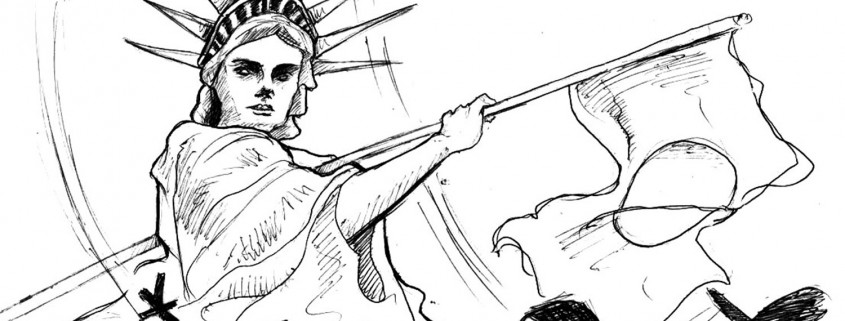Japan in need of United States aid to combat terrorist threat
Last April, when tensions were high between Japan and China because of disputed island territory, President Barack Obama took a trip to Japan to affirm that the United States will defend Japanese security interests.
Now, Japan finds itself threatened again by one of the globe’s most notorious terrorist organizations, the Islamic State of Iraq and Greater Syria, and it is again up to the United States to ensure that they win this fight.
Shinzo Abe, Japan’s prime minister, was touring the Middle East in late January to promote Japan’s relations with Middle Eastern countries. On Jan. 20, Abe was made aware that ISIS was asking for a $200 million ransom for two Japanese hostages. The specific request of $200 million is to equal the $200 million in aid Abe has promised to Middle Eastern countries fighting ISIS. After the first hostage was killed, the demand changed to the release of female suicide bomber Sajida al-Rishawi from a Jordanian prison, but the message from ISIS is still the same.
“Abe, because of your reckless decision to take part in an unwinnable war, this knife will not only slaughter [journalist] Kenji [Goto], but will also carry on and cause carnage wherever your people are found,” said a man in the video of the second hostage’s murder. “So let the nightmare for Japan begin.”
Japan needs a good relationship with the Middle East to support their giant economy; most of Japan’s oil comes from the Middle East. And while the country has been long governed by a pacifist constitution, Abe has been out to change that.
Through his aid package, he aims to side with the United States and their allies to fight terrorism, and he is not considering backing down from these aid efforts after the hostage event. Abe stated after the events this past week that Japan will “never give in to terrorism” and that “Japan will resolutely fulfill its responsibility to the international community in the fight against terrorism.” There is even a bill in the works to allow Japan’s Self Defense Forces to join the allies in efforts abroad.
For the time being, however, the Japanese rely mostly on the United States for security and defense. The Japanese don’t have the manpower or war technology to fend for themselves, particularly in hostage situations such as these, and even if they did, their constitution still prohibits it.
There were many in Japan who argued that the Japanese government should have simply paid the ransom to free the men. To do that, however, would have angered the United States and their allies, who consistently propose to never negotiate with terrorists.
Not only does Japan not want to anger the United States, but the United States also does not want to anger Japan. Should the potentially lucrative Trans-Pacific Partnership fail, there is a possibility that Japan will be the United States’ only reliable ally in the region.
The United States would need to have several sit downs with the Japanese government to determine what level of involvement is necessary, especially considering that much of the country is unsure about whether involvement in the war against ISIS at all is acceptable. But with the promises Obama has already made regarding security and the key role who play for us in Asia, it is clear that we must come to Japan’s defense in their time of need.
Claire Cahoon is a sophomore majoring in English. “Point/Counterpoint” runs Tuesdays.


Not sure what threat Claire believes Japan is facing. The brutal kidnaping and murder of two of their nationals working overseas was horrible, yes. But Japan does not seem to be facing the widespread Islamic terrorist threat that other countries do. Maybe a better suggestion would be for President Obama to promote a new alliance, similar to NATO. Japan could join it, if they wished.